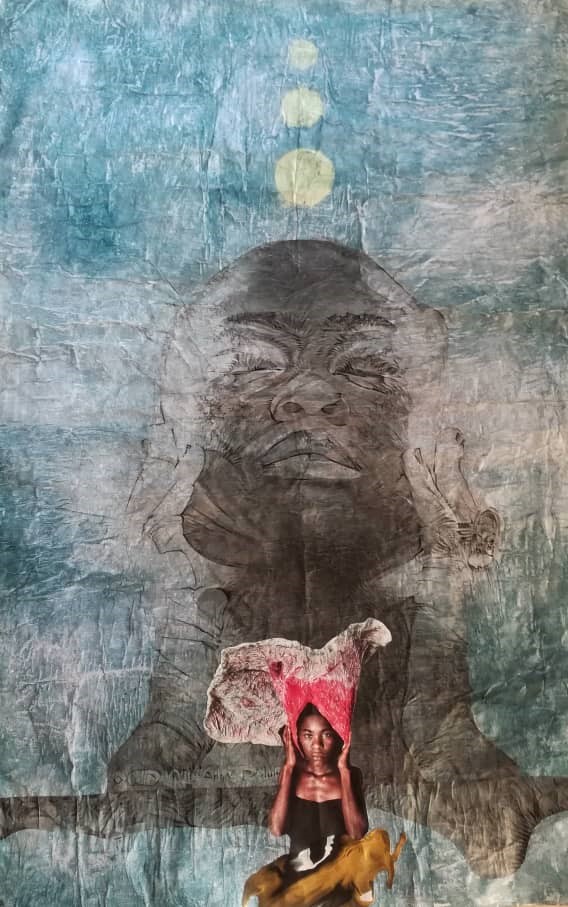
Art, argues Robinah Nansubugah, can be the conduit for an African renaissance: shaping voice and purpose through the creative potential of the continent.
Art is a critical tool for creating our identity, culture, and existence. In terms of Art as a critical component in resolving the world’s greatest issues, it is imperative that a relevant artistic movement manifesting a creative philosophical practice is available. Social movements like “Black Lives Matter” are expressed as cultural movements as well, and therefore relevant to the context of processes: where the intangible becomes tangible, where institutions are uplifted as platforms of resistance, and culture is viewed without bias. Africa needs to systematize a platform where Art is modeled and comes to life, rather than being bent by internalized western perspectives.
In engaging with Art as an expression of philosophies or movements, a question arises regarding the authenticity of African art and the cultural evaluation patterns of artistic practices in this era of multi-cultural interrelations. Previously, the artistic point of reference was African philosophies, with the objective of restoring the memory of African people and their culture. Is Africa today still inspired by these philosophies and movements? Where are the African philosophers of the present day? What African schools of philosophy are we inventing? Are mainstream leading philosophies today, such as Afro-futurism, coming only from an African-American perspective? Are they relevant in the African context as well? Is there no need to look into an alternative future for Africa, had it not been colonized and weakened through slavery?
African art seems to be confined to a global creative expectation. Its globalization, consumption, and desirability have always seemed to be consumed industrially. From a global perspective, the appearance of industrial reproduction of African art can be seen through fabrics, batiks, design, and symbols. But what is the cultural significance of African art today for the African continent, or for the movements of today?

Odur Ronald
Muwawa (Without Care)
Aluminum printing plates and
copper wires variable lengths
2020

"It is crucial to create storehouses for knowledge, libraries where written knowledge can be produced and shared. These knowledge hubs will ensure that knowledge is distributed to all, thus allowing for open dialogue and conversations on cultural movements."
Historical knowledge needs to be shared, passed on, and investigated with a variety of tools: written, oral, and virtual. In my understanding, African art has often originated from a spiritual perspective: expressed in rituals, ceremonial gatherings, and ethics which became social expressions, no longer just the spiritual or merely a part of a single community. These represented shared beliefs were tangible links throughout the continent, exercising a global impact on cultural inclusiveness. One example is Aubrey Williams in relation to the surrealism movement.
These claimed narratives created a unified understanding, pointing to the past—even though Africa does not represent itself as one united front of ideas or culture—to distinguish ourselves from Western influences. There are many tools these days, mostly the written texts that allow us freedom from dependence on oral history. Even though the publishing industry in the continent is flourishing, there is still too little writing. Not enough of the intellectual creation and influence emanating from the continent is being harnessed to create versatile philosophies for this generation of creatives. This makes one wonder if the education system needs to make some decisions about new curriculums, designed to help Africans become more familiar with their own philosophies.
It is crucial to create storehouses for knowledge, and libraries where written knowledge can be produced and shared. These knowledge hubs will ensure that knowledge is distributed to all, thus allowing for open dialogue and conversations on cultural movements. Knowledge exchange will be used as an experimental practice for investing in the creation of new philosophies that accurately reflect the history of the current generation. There is value in sharing, connecting, training, and development, all geared toward creating a space for a contemporary environment with fundamental aspects of Africa's own visibility; a space that will restore African philosophies through education, the youth, and cultural Art movements.

Pamela Enyonu
“Ebuwut Edou” (The Rain is Coming)
Collage, acrylic on hand-made paper canvas
2019
ROBINAH NANSUBUGA
An independent curator and film set designer Based in Kampala, Uganda. She is interested in using art and storytelling to unite and liberate people. Robinah uses art to learn about the challenges of cultural development within the social and cultural communities of chain values. She is particularly engaged by experimenting with the dynamics facing concepts and spaces, such as “exclusion” and “inclusion,” and “unknowing” and “knowing.” In 2020, Robinah curated the “East Meets East: Contemporary Art from Uganda” exhibition at the New Gallery Teddy in Jerusalem, facilitated by CoCuDi Center. She curated the first edition of Kigali Photography 2019 and is currently the curator of the Satellites-of-Art online gallery for art with impact.


